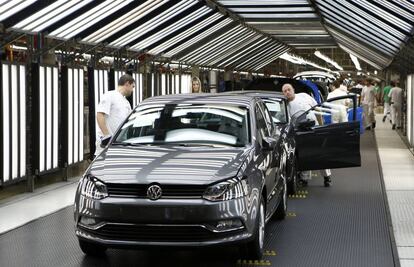Volkswagen wins 9 out 10 court cases in Spain over emissions claims
Judges rule pollution levels of German carmaker’s vehicles no worse than those of other brands
Volkswagen has won nine out of 10 lawsuits in Spain brought by buyers of its vehicles over rigged emissions levels. In 2016, only one court ruled partially in favor of the owner of a Volkswagen; in the other nine cases, judges decided that the German carmaker’s vehicles did not produce any more pollution than other cars and that there were no charges to answer, ruling against awarding damages to owners, according to summaries seen by EL PAÍS.

In September 2015, Volkswagen admitted that since 2008 it had deliberately interfered with the software on a number of Volkswagen, Audi, Seat, and Skoda diesel models Around the world, the German group sold a total of 11 million vehicles with fraudulent software, 700,000 of them in Spain. Since then, aside from compensation requests by the Spanish government, several individuals have brought legal action against Volkswagen showrooms where they bought their cars.
Furthermore, besides the original fraud involving software that deliberately reduced nitrogen oxide emissions during engine testing in order to pass environmental controls, the German carmaker subsequently admitted that carbon dioxide (CO2) emissions were also understated, and that some vehicles’ real fuel consumption could be higher than customers were led to believe.
In only one case did a court partially recognize the plaintiff’s grievance
The rulings in favor of Volkswagen are based on technical reports showing that Volkswagen’s emissions are no higher, and in some cases lower, than those of other vehicles in their category.
Almost all the judges who ruled in favor of Volkswagen noted that the company had offered to rectify the defective software free of charge.
In only one case did a court partially recognize the plaintiff’s grievance. This involved an Audi Q5 Ambiente, which cost €50,065 in May 2013. The owner wanted the car replaced with a new model free of charge, as well as compensation for damages.
But while the judge accepted the right to compensation, as well as noting that Volkswagen had “tricked” the relevant emissions controls and “infringed” the rules, a fine of just 10% of the value of the vehicle was imposed on the showroom that sold the car.
The German carmaker has admitted that CO2 emissions were also understated
The other nine rulings are all similar. In the case of a Volkswagen Tiguan Cross 2.0 bought in Valencia, a local court dismissed a complaint brought against the German carmaker, noting that the vehicle was “apt” for the purposes it was bought and that its emissions did not represent a greater threat to the environment than any other “similar” product.
Another court in Valencia rejected a similar compensation claim, noting: “It is well-known that Volkswagen will provide a technical solution to the engine, covering all costs derived from the implanting of said solution.”
A ruling by a court in the town of Manacor, in Mallorca, highlighted that emissions controls were not the main reason the plaintiff had bought an Audi A4 Avant, rejecting a request by the owner for compensation of €10,346 due to depreciation of the car: “It is true that the vehicle lacked the characteristics attributed to it, but it has not been accredited (and in this case not even alleged), that this was the main reason the car… was bought, for which reason, it cannot be ruled that the lack of information about the installation of the software has any relevance to the invalidation of the sales agreement.”
In November 2015, Spain’s High Court public prosecutor called for an investigation into the engine rigging scandal, noting that the German automobile group committed offenses related to misleading advertising, public subsidies given to the manufacturer by the Spanish government, and environmental legislation.
English version by Nick Lyne.
Tu suscripción se está usando en otro dispositivo
¿Quieres añadir otro usuario a tu suscripción?
Si continúas leyendo en este dispositivo, no se podrá leer en el otro.
FlechaTu suscripción se está usando en otro dispositivo y solo puedes acceder a EL PAÍS desde un dispositivo a la vez.
Si quieres compartir tu cuenta, cambia tu suscripción a la modalidad Premium, así podrás añadir otro usuario. Cada uno accederá con su propia cuenta de email, lo que os permitirá personalizar vuestra experiencia en EL PAÍS.
¿Tienes una suscripción de empresa? Accede aquí para contratar más cuentas.
En el caso de no saber quién está usando tu cuenta, te recomendamos cambiar tu contraseña aquí.
Si decides continuar compartiendo tu cuenta, este mensaje se mostrará en tu dispositivo y en el de la otra persona que está usando tu cuenta de forma indefinida, afectando a tu experiencia de lectura. Puedes consultar aquí los términos y condiciones de la suscripción digital.









































